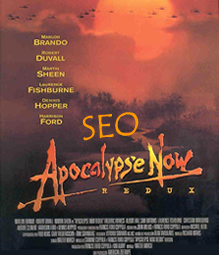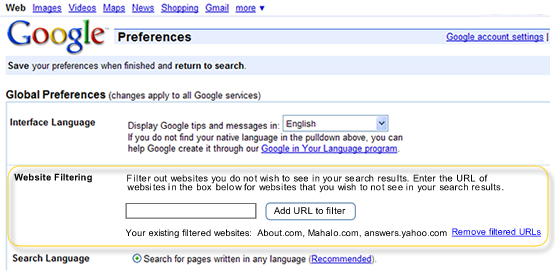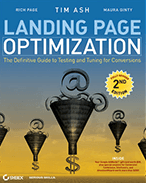A World Without SEO – Coming Sooner Than We Think?
Last updated | SEO. You have to love it – trying to outrank your competitors for top keywords. But lets face it. It’s morphing and changing by the week. Not only are search engine algorithms becoming increasingly complex and hard to consistently rank for, but SEO competition has reached near-breaking point and is harder to compete than ever before. And if you ask me, this all paints an ugly future for SEO specialists and firms, who are soon likely to begin struggling to effectively search engine optimize websites – and thus potentially a future without SEO as we know it today.
SEO. You have to love it – trying to outrank your competitors for top keywords. But lets face it. It’s morphing and changing by the week. Not only are search engine algorithms becoming increasingly complex and hard to consistently rank for, but SEO competition has reached near-breaking point and is harder to compete than ever before. And if you ask me, this all paints an ugly future for SEO specialists and firms, who are soon likely to begin struggling to effectively search engine optimize websites – and thus potentially a future without SEO as we know it today.
Here are the main reasons why I think we are going to have an SEO apocalypse sooner than most people might think…
1 – Increased personalization usage in search results. This has already started to happen – try searching for something when you are logged in to Google. You will often have different search results now, based on what you have search for before – and often different to other logged in users search results too. And Google are going to continue to increase the level of search results personalization, as a way of improving user satisfaction and to differentiate themselves from other search engines like Bing, who don’t have anywhere near as much user search data to be able to offer this. This will therefore mean increased fragmentation when it comes to trying to rank well for keywords – and will give SEO firms less power and influence, and more power to the actual search engine users.
2 – Increased focus on bounce rate and website user engagement to determine search rankings. Very much like how search quality in Google Adwords works currently, I predict that pretty soon this is also going to start applying to regular organic search rankings. In other words, if you are getting lots of clicks on your search engine ranking, but many people are leaving your website immediately upon arrival because of a bad site (users not finding what they want or poor navigation etc), Google will learn this over time and lower the ranking of your site. Google will therefore effectively promote the rankings of the sites who offer a better user experience.
3- Google introducing site result filtering preferences. Don’t like results appearing from About.com or Yahoo Answers in your Google rankings? In the future I guarantee you will be able to easily set preferences in Google to not serve results from that site, or any other sites you don’t like. And unfortunately the site you may be trying to perform SEO on may be removed from a user’s search engine results by this new feature – potentially for reasons outside of your control as an SEO expert. What happens if a user removes your site from their results because they had a bad customer experience or your product prices were too expensive? You get penalized in the search engines by the user, and there will be nothing SEO experts would be able to do about it. I predict this feature will happen pretty soon… I even mocked up below how it might look in the Google preferences section:

4 – Increased search engine focus on real-time search engine results. This one has already started, albeit in a botched way – Google have begun to understand the importance that users are now much more time sensitive in their need for information by introducing Twitter search results. Even though in my opinion they failed at this first attempt (often with highly irrelevant results), they will get this right, expand usage of this, and will no doubt start to give even more ranking boosts to sites with content that has become updated within the minute (rather than with a day or so as it seems like it is today). This will make it even more complex to rank well for keywords, with increased importance placed on non-traditional websites for information like Twitter and Facebook. Which leads me to my next point…
5 – Increased usage of non-traditional websites to find information online. Twitter and Facebook are smart. They want to gather real time information on their hundreds of thousands of members, and ultimately make it searchable, and thus become even more indispensible for people to use – thus increasing pageviews and ad revenue. Yes, Facebook and Twitter really are just new Googles in disguise. Only just last month, while out in Hollywood, the traffic was even worse than usual. Where did I think to search for reasons why the traffic was so bad? Twitter – I typed in ‘bad hollywood traffic’ into Twitter search, and sure enough found the answer within seconds – it was because of a Christmas parade. I didn’t even think to search Google because their data isn’t real time enough, and they don’t have armies of people experiencing life in order to tap into like Twitter and Facebook have. And mark my words, pretty soon you will start to see Facebook get into the search field – subtly at first. And then watch out Google. And performing SEO on Facebook and people’s wall updates? That’s going to be VERY tough.
6 – As a resulft of the above issues, SEO will become even harder, and thus even more competitive and cut throat. And this is already beginning to occur with search engine rankings – increasingly, you not only have to excel in SEO for your websites, but you also have to monitor and track what your competitors are doing. For example, it’s no longer as important to be #1 in Google if you can become #2 with a better link bait result title that is more compelling for the visitor to click on. Therefore, it will its getting much harder to perform effective traditional SEO because of increasingly sophisticated non-regular SEO techniques like this.
So there we have it. And don’t get me wrong. I’m not writing this because I am trying to brainwash you to try a different type of non-SEO website optimization that I preach and offer services for on this site. I love SEO, I just don’t see a particularly rosy future for it. And when other mediums like TV-based internet finally become mainstream (already starting to finally become a reality) its going to spell big trouble for the SEO industry.
Your thoughts? I would love to hear everyone’s opinion on the future of SEO – post below!



